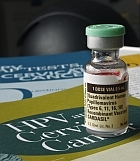 (Host) If you’ve got a daughter who’s under twelve – chances are you’re more worried about her falling off her bike than getting cervical cancer or a sexually transmitted disease.
(Host) If you’ve got a daughter who’s under twelve – chances are you’re more worried about her falling off her bike than getting cervical cancer or a sexually transmitted disease.
But many medical experts say parents need to be more proactive in educating their children about reproductive health before they become sexually active.
For girls, they say a new vaccine, which helps protect against certain cervical infections, may provide a place to start.
VPR’s Nina Keck has more.
(Keck) Depending on how much TV you watch, you may have seen this commercial.
(Commercial) "I want to be one less – one less – I want to be one less woman who will battle cervical cancer. Because now there’s Gardasil, the only vaccine that may help protect you from the four types of humanpapiloma virus that may cause 70% of cervical cancer."
(Keck) Gardasil is s a vaccine for women aged 9 to 26. It protects the body from certain types of the human papillomavirus – HPV for short. HPV – which is spread by sexual skin to skin contact – can cause changes in a woman’s cervix that can lead to genital warts and cervical cancer.
In the United States, cervical cancer is the second leading cause of death from cancer. That’s why women are encouraged to get regular pap smears – the test used to screen for these problems.
Health professionals recommend Gardasil – not because it’s a cure for HPV – but because it protects against four of the most prevalent strains of the virus.
(Goodwin) "Well we start to bring up Gardasil very typically at the age of nine."
(Keck) That’s Carrie Goodwin, a nurse practitioner in Rutland. She says the vaccine is administered over six months with three separate shots. She says its important that it be given before any sexual activity has occurred. By introducing the topic early – Goodwin says parents have time to ask questions and learn more. She says most of girls she treats end up actually getting the vaccine around age 11 or 12.
That’s a good time says Cheryl Gibson – Medical Director of Planned Parenthood of Northern New England. Gibson says that while Gardasil is approved for girls as young as 9, there’s no data yet showing how long the vaccine will last. So, she recommends it be given at age 12.
(Gibson) "Now a lot of people think 12 is too young to think about that but if you look at the national statistics and even our local statistics in Vermont we know that 50% of teens are sexually active by the time they’re 16, so that we really want to have them have some protection against the virus."
(Keck) Critics of the vaccine worry that too little is known about the long term effects it may have.
But Doctor Gibson says there are many long term studies of other vaccines made in a similar way to Gardasil, and she feels confident recommending it. Rutland nurse practitioner Carrie Goodwin says the protective benefits are huge since over time, most people are exposed to HPV.
(Goodwin) "If left unchecked, the human papiloma virus causes cells around the cervical area to become abnormal. And they need to be removed. So, what you’re trying to do is prevent cervical cancer and also some of these more invasive procedures.
(Keck) Procedures that she says can adversely affect reproduction. Despite the benefits, Goodwin says some parents worry that getting the vaccine will encourage their daughters to become sexually active.
On the contrary, Goodwin says, discussing Gardasil can be a good way for parents to open a dialog with their daughters about reproductive health in general.
Vermont’s Health Department recommends the vaccine for 11 and 12 year old girls and most insurance companies now cover it. For those not insured, or underinsured, the state has set aside two million dollars to pay for it.
Medical experts point out that Gardasil will not protect against all strains of HPV, so it’s important for women who’ve had the vaccine to continue to get regular pap tests.
For VPR News, I’m Nina Keck.
AP Photo/Harry Cabluck, FILE